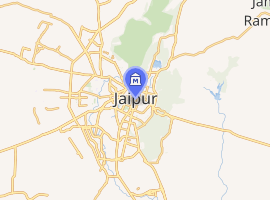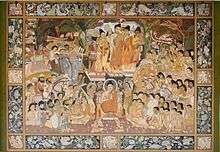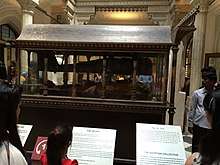Albert Hall Museum
The Albert Hall Museum in Jaipur is the oldest museum of the state and functions as the state museum of Rajasthan, India. The building is situated in Ram Niwas garden outside the city wall opposite New gate and is a fine example of Indo-Saracenic architecture. It is also called the Government Central Museum.
.jpg) | |

| |
| Location | Ram Niwas Garden, Jaipur, Rajasthan, India |
|---|---|
History
The building was designed by Sir Samuel Swinton Jacob, assisted by Mir Tujumool Hoosein, and was opened as public museum in 1887. Maharaja Ram Singh initially wanted this building to be a town hall, but his successor, Madho Singh II, decided it should be a museum for the art of Jaipur and included as part of the new Ram Nivas Garden.
It is named after King Edward VII (Albert Edward), during whose visit to the city as the Prince of Wales, its foundation stone was laid on 6 February 1876.[1]
Collection
The museum has a rich collection of artifacts including paintings, jewelry, carpets, ivory, stone, metal sculptures, and works in crystal.[2] The collection includes coins from the Gupta, Kushan, Delhi Sultanate, Mughal and British periods.[3]
An Egyptian mummy is the main attraction of this museum.
Gallery
| Wikimedia Commons has media related to Albert Hall Museum. |
Aerial View of Albert Hall
 Albert Hall Museum Night View
Albert Hall Museum Night View Albert Hall Museum Jaipur
Albert Hall Museum Jaipur- Museum Exterior
- Museum towers
 Museum Exterior
Museum Exterior Buddhist mural
Buddhist mural Jain Tirthankar
Jain Tirthankar Brahma statue
Brahma statue Artifacts of Albert Hall
Artifacts of Albert Hall Artifacts of Albert Hall
Artifacts of Albert Hall Lakshminarayan statue
Lakshminarayan statue Porcelain in Albert Hall
Porcelain in Albert Hall
References
- "Jaipur City (or Jainagar)". The Imperial Gazetteer of India. 1909. p. 402.
- "Albert Hall Museum Jaipur - Albert Hall Museum Jaipur Rajasthan - Albert Hall Rajasthan India". www.rajasthan-tourism.org. Retrieved 22 October 2018.
- India, Government of. "Albert Hall Museum, Jaipur". alberthalljaipur.gov.in. Retrieved 21 October 2018.
